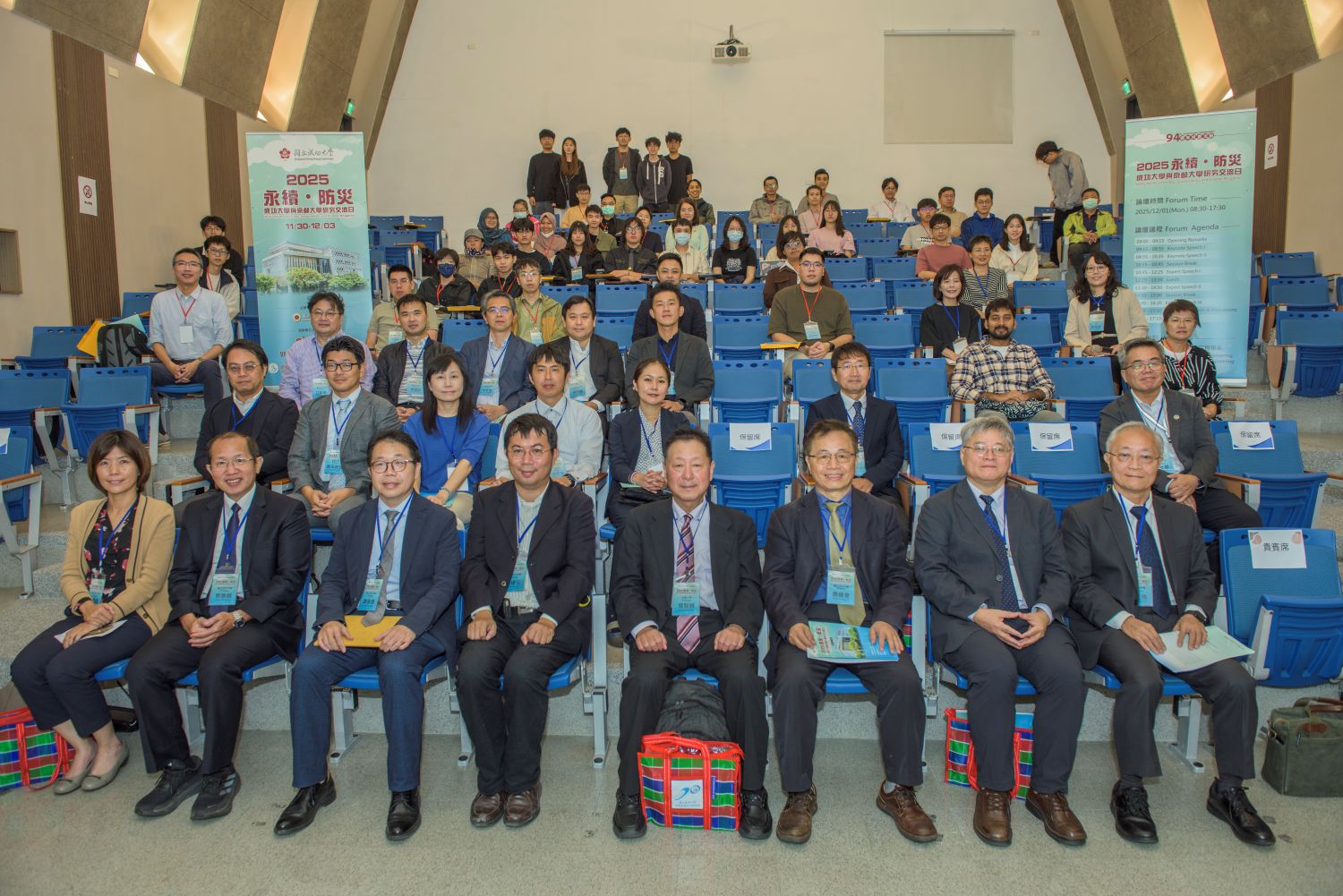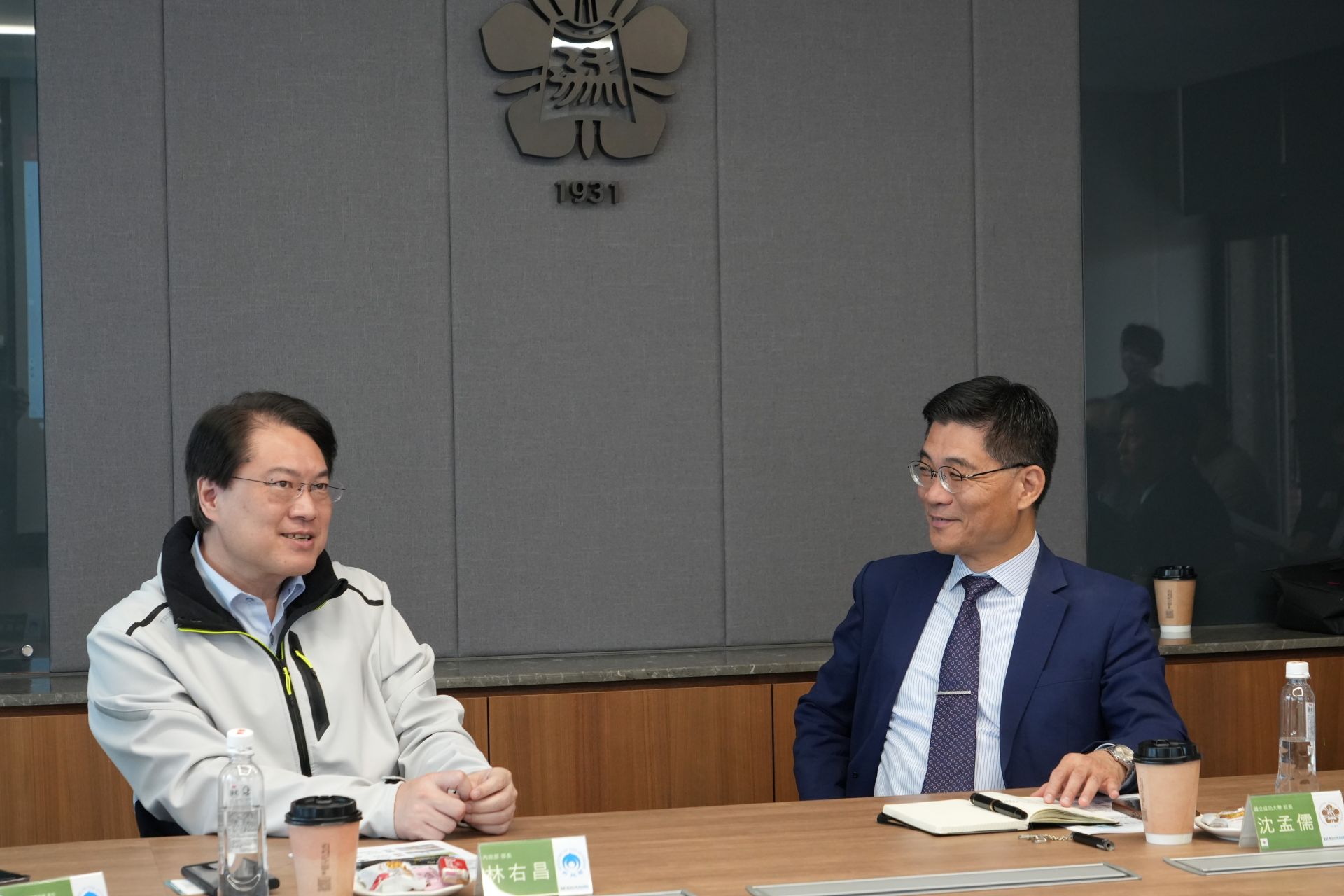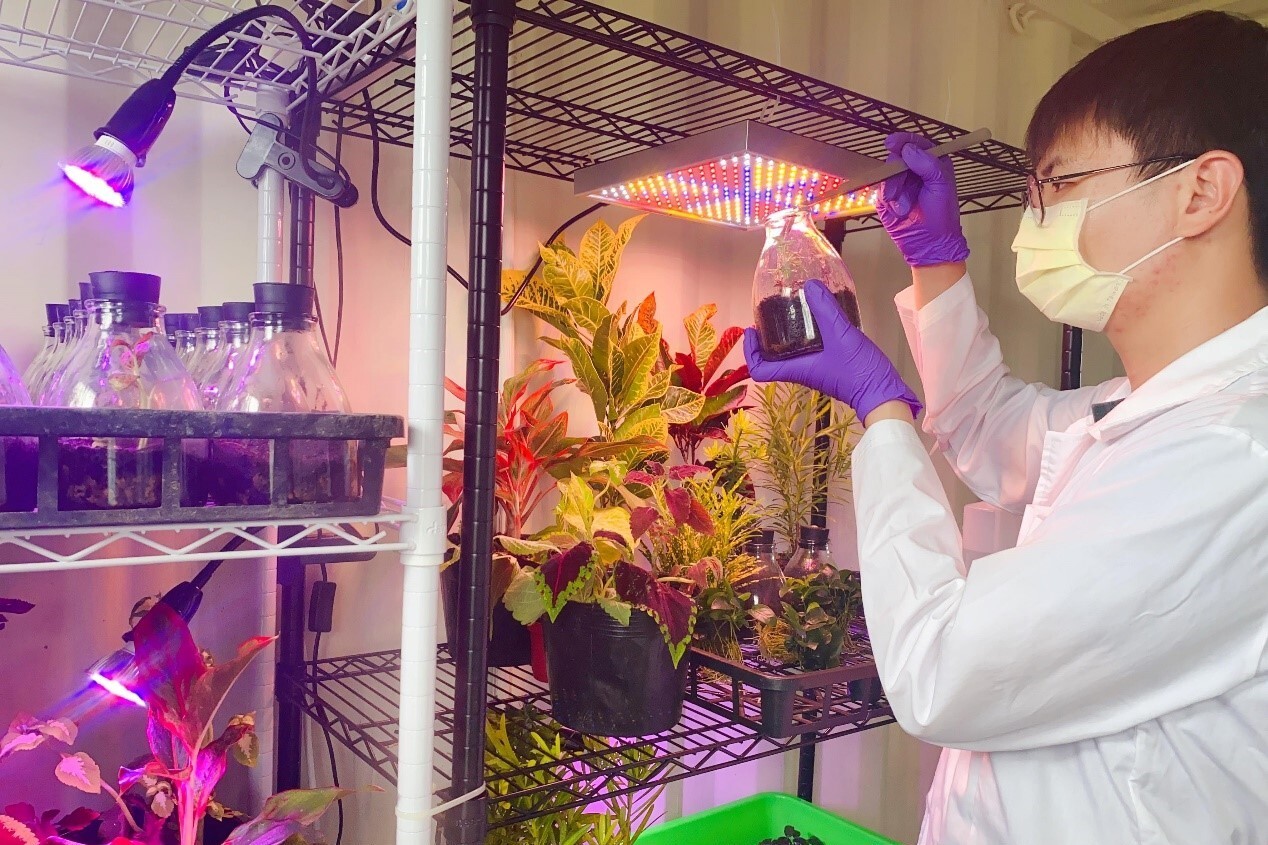SDG13
“Net Zero Technology Strategy × Industrial Sustainability Summit” Focuses on Climate Resilience and Carbon Reduction Actions
Jointly organized by the Ministry of Environment, the Executive Yuan Office of Energy and Carbon Reduction, the Department of Chemical Engineering at National Cheng Kung University (NCKU), and the NCKU Next-Generation Carbon Neutral Talent Cultivation Base, the “Net Zero Technology Strategy × Industrial Sustainability Summit” was held today (26th) at NCKU. Facing the disasters caused by extreme climate events, representatives from more than 100 enterprises across Taiwan gathered to declare their determination toward energy conservation and carbon reduction, aiming to achieve net zero emissions by 2050. The summit also sought to consolidate the strength of industry, government, academia, and research to discuss practical strategies. Minister of Environment Chi-Ming Peng emphasized in his remarks that, in the face of climate change, reducing emissions at the source and enhancing resilience within industries are the true keys to sustainable adaptation.
With the arrival of the global carbon border tax era, Taiwan’s industries are entering a critical juncture. Beginning in 2026, the European Union will impose carbon border adjustment mechanisms (CBAM) and invest more than 100 billion euros in clean industries. The Ministry of Environment pointed out that Taiwan’s industrial sectors face severe challenges. Notably, TSMC has announced that starting in 2025, “green and low-carbon chemicals and materials” will be included in its supplier evaluation criteria, signaling a major global supply-chain transformation. This means that suppliers failing to achieve low-carbon transitions in time risk being phased out.
Minister Peng noted that from July to September this year, extreme weather has repeatedly caused disasters, forcing continuous cycles of response, reconstruction, and recovery. He shared examples such as Tainan’s Cigu District, which suffered heavy rainfall damage unprecedented in the past, and the Hualien landslide-dam flooding caused by torrential rain totaling 800 mm in just two days—reminders from nature that climate change is already at our doorstep and cannot be ignored.
Peng further stated that enterprises present at the summit should empathize: energy saving and carbon reduction are no longer mere slogans. In the global net-zero trend, achieving net zero is not only an environmental issue or corporate social responsibility—it is an essential competitiveness factor. Since the Ministry’s elevation to a cabinet-level agency, it has established the Climate Change Administration and promoted mechanisms to strengthen national climate adaptation capacity. Among them, the carbon pricing system has received broad responses from businesses. The Ministry aims to assist willing companies to advance carbon reduction, laying the foundation for future emission-trading systems. Acknowledging the cost burden, Peng cited TSMC’s carbon-reduction cost per ton at NT$3,000–5,000 or more, emphasizing that the Ministry will expand support in the second half of next year to aid key enterprises such as China Steel Corporation (CSC) and Formosa Plastics Group (FPG).
He also explained that Taiwan’s carbon fee system will officially launch in 2025, with about 90% of regulated entities already submitting voluntary reduction plans to qualify for preferential rates—demonstrating that the mechanism is driving substantial industrial emission reductions. Peng urged all sectors to accelerate the promotion of low-carbon technologies and green supply chains, aiming for a 28 ± 2% reduction target by 2030. Although the challenge is tough, only through the integration of policies, technologies, and industry actions can Taiwan’s industries gain initiative amid global supply-chain restructuring.
The summit featured forums covering both traditional and emerging industries such as steel, petrochemicals, chemicals, and semiconductors:
Forum 1: “Transformation Opportunities for Taiwan Industries under the Global Green Competition” — chaired by Minister Peng, with keynote speakers from China Steel Corporation, Industrial Technology Research Institute (ITRI), and Professor Emeritus Chuh-Yung Chen of NCKU, analyzing opportunities for Taiwan’s industries under low-carbon materials, circular economy, and net-zero technology strategies.
Forum 2: “Building Green Competitiveness in Low-Carbon Materials and the Semiconductor Industry” — focusing on how SMEs can supply low-carbon products and materials. The forum emphasized that low-carbon chemicals and materials are crucial to semiconductor net-zero transformation. Domestic chemical manufacturers capable of providing low-carbon-footprint products can move beyond being low-cost suppliers to become strategic partners in the global green semiconductor manufacturing chain, creating new export momentum while helping firms such as TSMC reach net-zero goals.
Forum 3: “Urban Mining and Strategic Precious Metals: A Forward-Looking Layout” — chaired by Deputy Executive Director Tze-Luen Lin of the Executive Yuan Office of Energy and Carbon Reduction, focusing on Taiwan’s challenges and opportunities in the global strategic-metal supply chain. High-purity precious metals are indispensable to semiconductors, automobiles, and renewable-energy equipment. Yet Taiwan’s long-term import reliance poses risks. Through urban-mining recycling and refining, Taiwan can establish a secondary domestic supply chain for strategic metals.
Representatives from LIANYOU METALS, HUAN YANG TECHNOLOGY, and FORCERA MATERIALS — firms with expertise in metal processing, chemical manufacturing, and recycling — joined the discussion on building local refining capabilities to reduce import dependence and enhance resilience. The event drew more than 400 experts from industry, government, academia, and research, united by a common goal to contribute to energy conservation and carbon reduction.
With the arrival of the global carbon border tax era, Taiwan’s industries are entering a critical juncture. Beginning in 2026, the European Union will impose carbon border adjustment mechanisms (CBAM) and invest more than 100 billion euros in clean industries. The Ministry of Environment pointed out that Taiwan’s industrial sectors face severe challenges. Notably, TSMC has announced that starting in 2025, “green and low-carbon chemicals and materials” will be included in its supplier evaluation criteria, signaling a major global supply-chain transformation. This means that suppliers failing to achieve low-carbon transitions in time risk being phased out.
Minister Peng noted that from July to September this year, extreme weather has repeatedly caused disasters, forcing continuous cycles of response, reconstruction, and recovery. He shared examples such as Tainan’s Cigu District, which suffered heavy rainfall damage unprecedented in the past, and the Hualien landslide-dam flooding caused by torrential rain totaling 800 mm in just two days—reminders from nature that climate change is already at our doorstep and cannot be ignored.
Peng further stated that enterprises present at the summit should empathize: energy saving and carbon reduction are no longer mere slogans. In the global net-zero trend, achieving net zero is not only an environmental issue or corporate social responsibility—it is an essential competitiveness factor. Since the Ministry’s elevation to a cabinet-level agency, it has established the Climate Change Administration and promoted mechanisms to strengthen national climate adaptation capacity. Among them, the carbon pricing system has received broad responses from businesses. The Ministry aims to assist willing companies to advance carbon reduction, laying the foundation for future emission-trading systems. Acknowledging the cost burden, Peng cited TSMC’s carbon-reduction cost per ton at NT$3,000–5,000 or more, emphasizing that the Ministry will expand support in the second half of next year to aid key enterprises such as China Steel Corporation (CSC) and Formosa Plastics Group (FPG).
He also explained that Taiwan’s carbon fee system will officially launch in 2025, with about 90% of regulated entities already submitting voluntary reduction plans to qualify for preferential rates—demonstrating that the mechanism is driving substantial industrial emission reductions. Peng urged all sectors to accelerate the promotion of low-carbon technologies and green supply chains, aiming for a 28 ± 2% reduction target by 2030. Although the challenge is tough, only through the integration of policies, technologies, and industry actions can Taiwan’s industries gain initiative amid global supply-chain restructuring.
The summit featured forums covering both traditional and emerging industries such as steel, petrochemicals, chemicals, and semiconductors:
Forum 1: “Transformation Opportunities for Taiwan Industries under the Global Green Competition” — chaired by Minister Peng, with keynote speakers from China Steel Corporation, Industrial Technology Research Institute (ITRI), and Professor Emeritus Chuh-Yung Chen of NCKU, analyzing opportunities for Taiwan’s industries under low-carbon materials, circular economy, and net-zero technology strategies.
Forum 2: “Building Green Competitiveness in Low-Carbon Materials and the Semiconductor Industry” — focusing on how SMEs can supply low-carbon products and materials. The forum emphasized that low-carbon chemicals and materials are crucial to semiconductor net-zero transformation. Domestic chemical manufacturers capable of providing low-carbon-footprint products can move beyond being low-cost suppliers to become strategic partners in the global green semiconductor manufacturing chain, creating new export momentum while helping firms such as TSMC reach net-zero goals.
Forum 3: “Urban Mining and Strategic Precious Metals: A Forward-Looking Layout” — chaired by Deputy Executive Director Tze-Luen Lin of the Executive Yuan Office of Energy and Carbon Reduction, focusing on Taiwan’s challenges and opportunities in the global strategic-metal supply chain. High-purity precious metals are indispensable to semiconductors, automobiles, and renewable-energy equipment. Yet Taiwan’s long-term import reliance poses risks. Through urban-mining recycling and refining, Taiwan can establish a secondary domestic supply chain for strategic metals.
Representatives from LIANYOU METALS, HUAN YANG TECHNOLOGY, and FORCERA MATERIALS — firms with expertise in metal processing, chemical manufacturing, and recycling — joined the discussion on building local refining capabilities to reduce import dependence and enhance resilience. The event drew more than 400 experts from industry, government, academia, and research, united by a common goal to contribute to energy conservation and carbon reduction.

Minister of Environment Chyi-Ming Peng Emphasizes Carbon Reduction and Resilience in Facing Extreme Climate Events

The “Net Zero Technology Strategy × Industrial Sustainability Summit” was held at NCKU






















